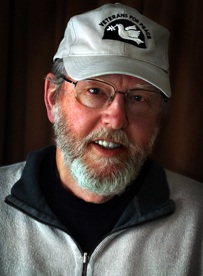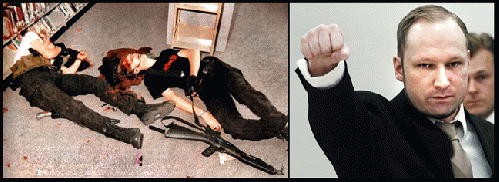I'm a devoted scourer of thrift shop book shelves. I love looking through the books that people have discarded. Much of it is pop trash, but there's always that gem or a handful of books that capture my interest for some reason. Thrift shops are the antithesis of fashion, so the books one finds there are often focused on dated ideas or stories.
Such was the case with The Cold Fire: Alienation and the Myth of Culture, a small book published in 1976 by two psychiatry professors, Stanley Rosenberg and Bernard Bergen. It's very much a book of the mid-seventies, steeped in existentialism and the spirit of reform and protest. The writers drop quotes from Soren Kierkegaard and Friedrich Nietzsche; they discuss classic novels of alienation popular then, like Joseph Heller's Catch-22, Ralph Ellison's The Invisible Man and Saul Bellow's Herzog; they discuss iconic personalities like Bob Dylan, Eldridge Cleaver and Abbie Hoffman. In 1976, alienation was still a popular topic; it was a positive contribution to discussions of the day. The Eisenhower fifties were past; John Kennedy was dead; the civil rights movement had reached a plateau after being linked with the Vietnam War, which had now become a refugee problem. The idealism of the early sixties was gone, but it was still a time of upheaval; in 1976, people were still asking questions. It made perfect sense, as Rosenberg and Bergen do, to psychologically examine the topic of alienation from a culture and what that alienation said about culture as the sum of human interactions.
"The alienated position consequently involves a sense of despair over the self ... and over its inability to break out of bad faith," they write. "In these moments the actions that have constituted much of one's being in the world come to look absurd. This sense of absurdity also reveals to the self the madness of a culture which dictates that the self play out such bad faith. And once alienated, the self can see culture only as a continual, pointless violence." For the bombardier Yossarian in Catch-22, "Alienation was, in fact, presented as the only stance a sane man could assume in a system that made no sense."
As a recalcitrant teenager, I picked up a blue paperback copy of Catch-22 at Grandpa's Trading Post on US-1 in Homestead, Florida, where I lived. The nostalgia for reading that novel as a kid in 1965 is strong. I read the novel next at a firebase in the forests near the Cambodian border where we were periodically mortared by the North Vietnamese troops I was trying to locate with my direction finder radio. I finally I read it as a literature student on the GI Bill at Florida State University where I learned that the 1955 novel was not only inspired by experiences in World War Two, but also by Heller's time after the war working in the New York corporate world of advertising. You might say I was "radicalized" by Joseph Heller.
"There was only one catch and that catch was Catch-22, which specified that a concern for one's safety in the face of dangers that were real and immediate was the process of a rational mind. Orr was crazy and could be grounded. All he had to do was ask; and as soon as he did, he was no longer crazy and would have to fly more missions."
Any serious discussion of alienation and absurdity like this has been purged from the mainstream media and from our minds. The purge began in the late 1970s when technological innovation began to hit its stride and the American political right began its ascendancy. It has now reached a pinnacle of sorts with the nativist (some would say quite absurd and alienating) ravings of Donald Trump. As the right ascended, it dragged most Democrats along as opportunists and money-addicted hacks. Today, if you raise the idea of alienation from the culture we live in -- one of militarized/financialized/consumer capitalism -- you're assumed to be a loser or a subversive.
What I am is a radical-pragmatist. I'm a radical in the sense of my Webster dictionary's primary definition: "Of or going to the root or origin." Our National Security State and our mainstream Media tend to employ the ninth definition in my Webster: "A person who holds or follows strong convictions or extreme principles; extremist." Shooting people down in a conference hall is the act of an "extremist" -- not that of a "radical." I add pragmatist to the mix because I will dialogue with anyone and I accept compromise as the way of the world. I'm not a pacifist, but it seems to me radicals are generally not the ones initiating violence in this world.
The other day I picked up a book hot off the presses that I consider the heavy artillery on alienation and despair in today's dangerous world. It's called Heroes: Mass Murder and Suicide by an Italian who writes in English, Franco "Bifo" Berardi. He's a radical in the best sense of the word, and yes, he's a leftist who has no doubt read his Marx, though Berardi's writing is not focused on economic analysis but on culture, psychology and communications: How culture is formed by language out of chaos; how minds are influenced and deluded; how we so readily shut out or forget inconvenient truths; how individuals can be consumed by culture. Berardi is as lucid and as witty a writer as Bertrand Russell was back in 1950 when he wrote, in the epigram above, about the "nonsense" a National Security State tends to dish out.
"Why did I write such a horrible book?" Berardi asks himself. Starting in 2012, he began researching a host of international mass murders and suicides. The vision he sketches out is, indeed, quite "horrible," and the bad-guy tends to be the so-called neoliberal, free-market capitalist obsession with productivity and the demoralizing effects it has on many people around the world. When a person becomes so alienated and reaches a condition of such despair -- no matter where he or she lives -- murder and/or suicide become real options. Berardi writes about incredible suicide rates among farmers in India in response to Monsanto's monopoly control of seed production that has devastated their traditional, subsistence-based lives. Suicide is seen as a last-ditch effort at dignity and identity among workers of a massive Foxconn electronics plant in Taiwan where popular Apple iPhones and iPads are made. Foxconn's 400,000 employees are heavily controlled by security. Three million square meters of netting was put around dormitories to catch suicide jumpers. In one case, several young workers rigged up bombs that killed themselves and burned down major buildings in the complex. Berardi links this to today's youthful pop obsession with zombies, which were mythically rooted in brutal Haitian slave culture. According to Amy Wilentz, "Suicide was the slave's only way to take control over his or her own body." The zombie is a case of a half-death -- the walking dead. For Haitian slaves, becoming a zombie constituted a failure to fully escape the hell of the plantations, since they came to associate death with a comforting return to the motherland. Slave owners saw suicide as a form of theft of labor, Wilentz says. The zombie was "the scarecrow keeping slaves from killing themselves." Overall, Berardi sees more similarities than differences among mass suicides, angry Arab Muslim terrorists, a right-wing mass killer in Norway and a couple of bullied kids in Columbine.
The point is there's a cause and effect relationship going on here that our National Security State and Mainstream Media refuse to recognize or discuss seriously. Why? Because it's uncomfortable and critical of a culture that self-promotes itself as "exceptional." Like George W. Bush or Donald Trump, America can do no wrong; regrets or apologies are never in our quiver of options. Since the days of Jimmy Carter's malaise speech the forces of expansionism and repression have reacted harshly against suggestions there's anything unhealthy about the engine that drives America's success in the world. In fact, the vicious backlash against President Barack Obama makes sense if his presidency is seen (as many on the right do) as a re-run of Jimmy Carter's focus on dignity and decency. In that sense, Trump's bumper sticker line -- "Make America Great Again" -- is an echo in a much more cynical and dangerous time of the entertainer Ronald Reagan's 1980 campaign.
Despairing Humans Running Amok
"We are breeding a generation of human beings whose primal impressions come from a machine -- it's the first time in history this has occurred." Rose Goldstein wrote this in The Show and Tell Machine forty years ago. Berardi sees this today as flat-out "mass psychopathology" that is having profound effects on how young people learn language and interrelate. Culture is an entirely random creation rooted in the signs and symbols of language, and in an information-based culture like ours this trumps economics, which is why it interests thinkers like Berardi. When culture and lived experience become for kids "virtual," when living "on-line" is more important than person-to-person living, empathy becomes a lost art. Empathy, Berardi says, "is not a natural emotion, but rather a psychological condition that is cultivated and refined, and which, in the absence of such cultivation, can wither and disappear."
Something like this was the case with Eric Harris and Dylan Klebold, the Columbine killers. A slight youth bullied in school, Harris wanted to join the Marines but was rejected shortly before the massacre because he was taking a court-ordered anti-depressant to manage his anger. He believed in social Darwinism and wore a white t-shirt with the words "Natural Selection" on his chest the day of the massacre. He wrote in his journal, "Everyone is always making fun of me because of how I look, and how f*cking weak I am and sh*t. "You people could have shown more respect, treated me better, asked for my knowledge or guidance more, treated me more like a senior, and maybe I wouldn't have been as ready to tear your f*cking heads off." Klebold shared his friend's view. Berardi sums that view up as being a "loser [who] wants to be a winner, for an hour, before a violent death." Klebold wrote, "You've been giving us sh*t for years. You're gonna f*cking pay for all the sh*t! We don't give a sh*t. Because we're gonna die doing it."
Berardi sees larger political implications in this tragic scenario. "Harris and Klebold's psychology could be synthetically described as a suicidal form of the Neoliberal will to win. In the wake of the Neoliberal proclamation of the end of class struggle, the only social categories remaining are winner and loser. ... Either you are strong and smart, or you deserve your misery."
We would expect defenders of the neoliberal free-market system to disagree. But there's a good argument -- granted one employed on the left -- that the so-called neoliberal structuring of life approaches in many areas a totalitarian condition. Berardi makes that clear when he cites the despair implicit in massive, cold-blooded corporate systems that employ workers under terms he refers to as "blackmail," where the implicit message is suffer under our slave-like work rules or leave -- and starve.
(Note: You can view every article as one long page if you sign up as an Advocate Member, or higher).






